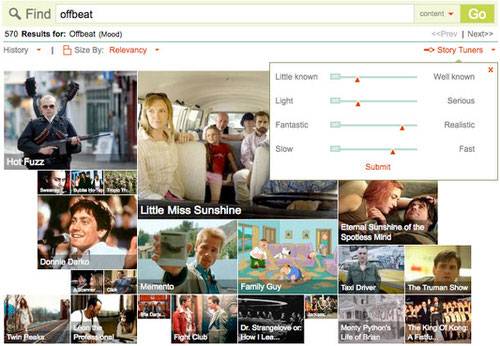We’re currently running a series of posts about recommendation technologies and in the comments of our last post about the Netflix Prize, a company called Jinni made itself known. Jinni is a kind of ‘Pandora for movies’, because it aims to recommend movies and tv shows to you based on its Movie Genome (aping Pandora’s Music Genome Project). Jinni’s genome project contains over two thousand “genes” that describe plot, mood, style, setting, soundtrack and more. Jinni says that its ontology was created by film professionals – much like Pandora employs people to create its unique music database.

How it Works
Jinni says that its video content is automatically indexed, using a mixture of metadata and reviews. It has a strong semantic technologies component, as it uses a proprietary Natural Language Processing solution to assign semantic tags to content and users. The company claims that this allows Jinni to “rapidly index more titles, becoming the universal catalog for professional video.” When it launched in December, Jinni had 10,000 movie, TV and video titles. It also offers APIs for Internet and TV content providers.
In terms of its recommendations philosophy, Jinni believes that a mix of algorithms and human selection is the best solution. Although the initial data set comes from humans entering movie information into a computer, the actual recommendations come from its algorithm – which “can deeply analyze the type of content you like” and hence learn about your tastes in movies. Jinni gives you recommendations by “comparing your Taste Types and the genes of all the titles in our catalog”.
Does it Work?
I took Jinni for a test drive, with a search on ‘mood’. I quite like an “offbeat” movie on a Friday night, so it was an appropriate place to start. Also ‘offbeat’ movies like Napoleon Dynamite are the type of films that have caused the Netflix Prize contestants a lot of problems. So I clicked on that mood to see what came up.

The default video selections included ones like Twin Peaks, Donnie Darko, Hot Fuzz, Monty Python, and so on. It was a fairly predictable selection, but where Jinni promises to come into its own is when you filter down. There is a ‘Story Tuner’, which presented some interesting filter options.

I filtered based on the story tuners (little known, light, realistic, fast-ish) and got recommended a 1990 movie called ‘Mr Destiny’ starring James Belushi. I can’t recall ever seeing it (little known? check!) and while I’m not really a James Belushi fan, it’d be worth a try. I tweaked the light/serious meter up to ‘serious’ and that gave me a neat selection of 9 films, few of which I’d seen – but they all looked interesting. This is what you want from a recommendation engine – to be told about products you didn’t know about before. So Jinni appears to work quite well. There are many other filters other than mood; rating, date, length, plot, genres, and more.
In his review, Chris Gampat concluded that Jinni isn’t quite Pandora for movies. That may be true, but we think Jinni is worth a try if you’re a movie or tv show buff. It’s also similar to ClerkDogs, which we reviewed recently. So if you’ve tried either or both, let us know in the comments what you thought.
ReadWriteWeb Resources for Recommendation Technologies
We will be profiling other recommendation companies in upcoming posts. We also invite you to explore using our custom ReadWriteWeb Resources:
- RWW Recommendation Industry Feed Favorites OPML file (save link)
- RWW Recommendation Industry Feeds – Best of Feed (copy and paste to your reader)
- Click to preview the above feeds before subscribing (pop-up window)
- RWW Recommendation Site Search (Visit and Bookmark)
















